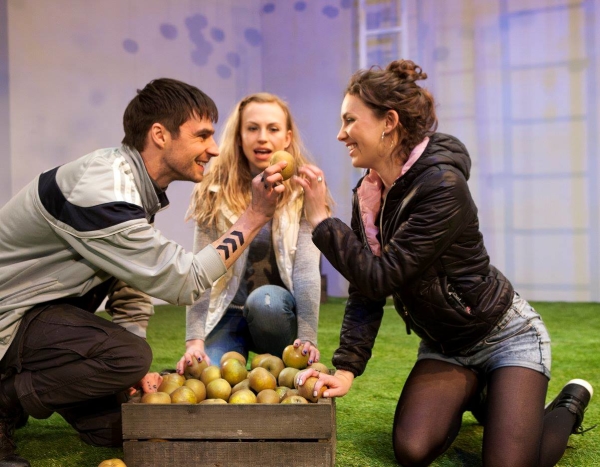The Harvest (Ustinov Studio, Bath)
Michael Boyd helms a moving exploration of Belarusian youth

© Simon Annand
The work on the surface is simple; four young people are harvesting a field for apples where they bicker, compete and make eyes at each other, whilst being afflicted by the malaise of the day, no longer able to perform simple practical task such as nailing in nails without causing bloody injury.
It's a light farce that is the Belarusian equivalent of the quarter life crisis piece. On a deeper level it examines entropy, steady detoriation; the apples that fall into mush are a symbolic representation of a youth in stasis, caught up in a world where technology is king and the 'natural' has no place for nature.
Writing in a country where censorship exists forces Pryazhko to lay his political points out gently; only in the ailments the four youths exhibit do some of the horrors of a generation affected by the Chernobyl meltdown really come to the fore. Outside of this they pass the time with one-upmanship, first base flirting and physical routines that pay homage to slapstick comedians of the golden age.
'Boyd has assembled a creative team who have produced some exquisite work'
At just under an hour it is an entrée rather than a full banquet, an interesting tidbit that on its own doesn't feel complete. But it's given the customary high class production one expects from the Ustinov.
Dafydd Llyr Thomas, Beth Park, Dyfan Dwyfor and Lindsey Campbell possess either Slavic bone structure or Slavic appetities and all give thoughtful work under former head RSC head honcho Michael Boyd's detailed direction. The performances are solid and stolid as the characters lumber into inertia, but lack the frisson of danger that would allow the final moments as anarchy descends to hammer the nail home.
Boyd has assembled a creative team who have produced some exquisite studio work; Madeleine Girling's design which encompasses hanging apples (which reminds one of Tom Scutt's Constellations balloon work), tall ladders and a floor of lush green grass that looks blooming in Technicolor during the early sections and grey and wiped out as evening descends under Charles Balfour's delicate lighting.
Season after season The Ustinov is allowing its audience to hear voices from around the theatrical world. Due to its restricted development, can we hold The Harvest up to the same scrutiny as a British play with the freedom that gives the writer? One hopes for the day where Pryazhko and his fellow countrymen can write free of fear of repercussion and their full voices can be heard. From the evidence here, it's a voice well worth hearing.
The Harvest continues at Theatre Royal Bath until 11 April












